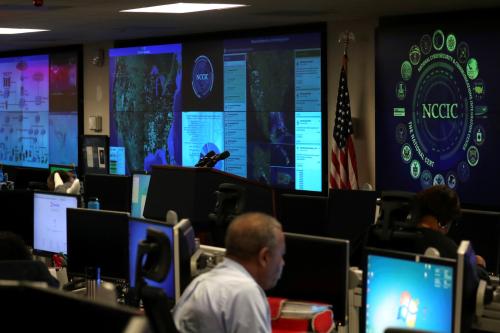As is well known by now, President Bush has developed a doctrine of early action known as pre-emption to guide American foreign policy in the age of terror.
First articulated at a speech at West Point in the spring of 2002, then formalized as part of his national security strategy that same fall, the basic idea of the concept is that the world has become too dangerous for the United States to absorb attacks first and then respond. We must find and defeat extremists before they carry out catastrophic attacks against us.
There are a few points that need to be made right away.
First, as Colin Powell has argued convincingly, the Bush pre-emption doctrine is just common sense. Of course if someone is going to strike you first, and you know it, you should try to prevent that by getting in the first blow—especially if their first strike could prove devastating. (In fact, it is worth noting that even France reserves the right to pre-empt as part of its national military strategy.)
Second, Bush is far from the only American president to entertain the idea of pre-empting threats to the United States. For example, in the Cold War, Eisenhower’s nuclear strategy anticipated striking the then-small Soviet bomber force before it could get airborne, should superpower war seem likely.
Kennedy forced the Soviets to dismantle their weapons or be pre-empted during the Cuban missile crisis. Clinton threatened North Korea with a pre-emptive strike in 1994 over its nuclear reactor program, and then together with NATO allies did pre-empt Slobodan Milosevic, the Serb leader, after early signs that he planned to carry out atrocities against the Albanians of Kosovo in 1999.
Third, Bush’s national security strategy is not only about pre-emption. It is a balanced document that also emphasizes the need for strong alliances, good diplomacy, foreign assistance programs, traditional military deterrence and cooperation with other great powers, including even China and Russia.
Pre-emption is a tool intended for terrorist organizations and the extremist states that aid them, especially if those states also develop weapons of mass destruction.
A tool, not an agenda
So as an idea, pre-emption is neither all that new nor all that objectionable. But is it smart to elevate it to a formal doctrine and make it the bumper sticker for a whole presidency? And can it really help us very much in the future?
On the first question, I would tend to say no. In my judgment, pre-emption doctrine has cost this administration greatly around the world, even if the idea behind it is defensible.
To be fair, pre-emption doctrine may have helped persuade Libya’s Moammar Gadhafi to give up his weapons of mass destruction (though Gadhafi had been gradually moderating his policies ever since the first Bush administration).
And it is possible, though not yet clear, that Syrian President Bashar Assad is showing a bit more restraint in his support for terrorists due to fear that the same pre-emption doctrine that led to the overthrow of Saddam last year could be turned next on him.
But in regard to Iraq policy, pre-emption doctrine increased other countries’ inclination to oppose the overthrow of Saddam Hussein. We had international law as well as principle on our side, since Saddam was a monster who had used weapons of mass destruction against Iran and his own people and who had violated 17 U.N. resolutions.
But even so, many countries felt so nervous about whom the United States would allegedly attack next, after dealing with Saddam, that they opposed the war with a vigor and venom that seems surprising under the circumstances.
For example, France talked explicitly about the need to balance the power of the United States and check the Bush administration when explaining its position against the war. In other words, while Bush may in my eyes have been within his rights to overthrow Saddam, given the danger that dictator could have again posed to his neighbors and his own people, using pre-emption doctrine to justify the war seems to have made the diplomatic job harder rather than easier.
In regard to North Korea, pre-emption doctrine gave the terrible Stalinist state of Kim Jong Il an excuse for keeping and indeed expanding its nuclear capabilities over the last two years. Pyongyang could claim that it needed protection against a United States that might attack it after dealing with Saddam.
Of course, this argument was wrong; any Korean war would be so extraordinarily deadly that no American president could embark upon it just to fulfill some quasi-academic doctrine. Moreover, South Korea would have none of such a war at this point. But the perception that the Bush administration was likely to strike again gave North Korea a talking point—and some countries in the region appear to have had some sympathy for its position.
Partly as a result, it has been hard to get all countries in the so-called six-party talks to pressure North Korea sufficiently to persuade that country to give up its nukes.
It’s all about what you know
Then there is the final question of whether we can really use pre-emption doctrine in the future. After weapons inspector David Kay’s recent testimony that our intelligence was badly wrong on Iraq, some have argued that even if pre-emption is a sound idea in theory, we don’t have good enough information to make it a realistic option in practice.
There is some truth to that. Certainly we can’t attack weapons we can’t see; we can’t easily invade countries that might—but also might not—have illegal weapons or nefarious ties to al-Qaida; we can’t get very much allied support if other countries think our intelligence is probably wrong.
But our intelligence is also often right. Indeed, it has uncovered a great deal of information recently about an underground global nuclear economy involving North Korea, Pakistan, Iran, Libya and other states.
Moreover, in one fundamental sense Bush is clearly correct—we cannot always wait for dangers to gather in a world of weapons of mass destruction and al-Qaida. In some cases, imperfect information or not, the alternative to pre-empting will be to risk a catastrophic attack on our own territory or against our allies.
So we need to keep the pre-emption option at hand. But we are better off not advertising it as America’s new foreign policy strategy. Doing so breeds resentment, complicates diplomacy and tips off terrorists and extremists that we may strike.
If Bush had emphasized the potential importance of pre-emption as an academic paper for my graduate course at Columbia University, I would have given him an A. But as an official government policy, it has earned a far lower mark so far, and it would be best if we were to gradually let it fade away as doctrine while retaining it as a tool to be used when no alternative exists for protecting the country’s security in this dangerous time in our history.
The Brookings Institution is committed to quality, independence, and impact.
We are supported by a diverse array of funders. In line with our values and policies, each Brookings publication represents the sole views of its author(s).



Commentary
Op-edDoctrine Not Radical
February 29, 2004